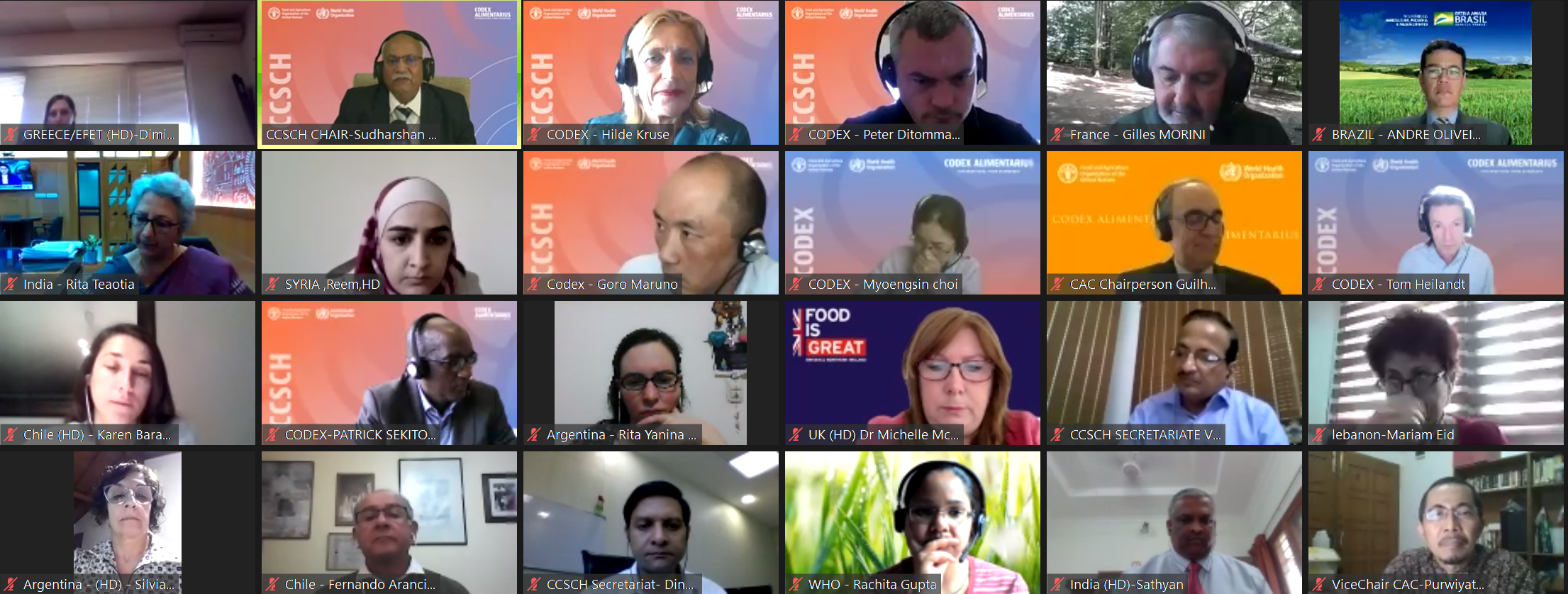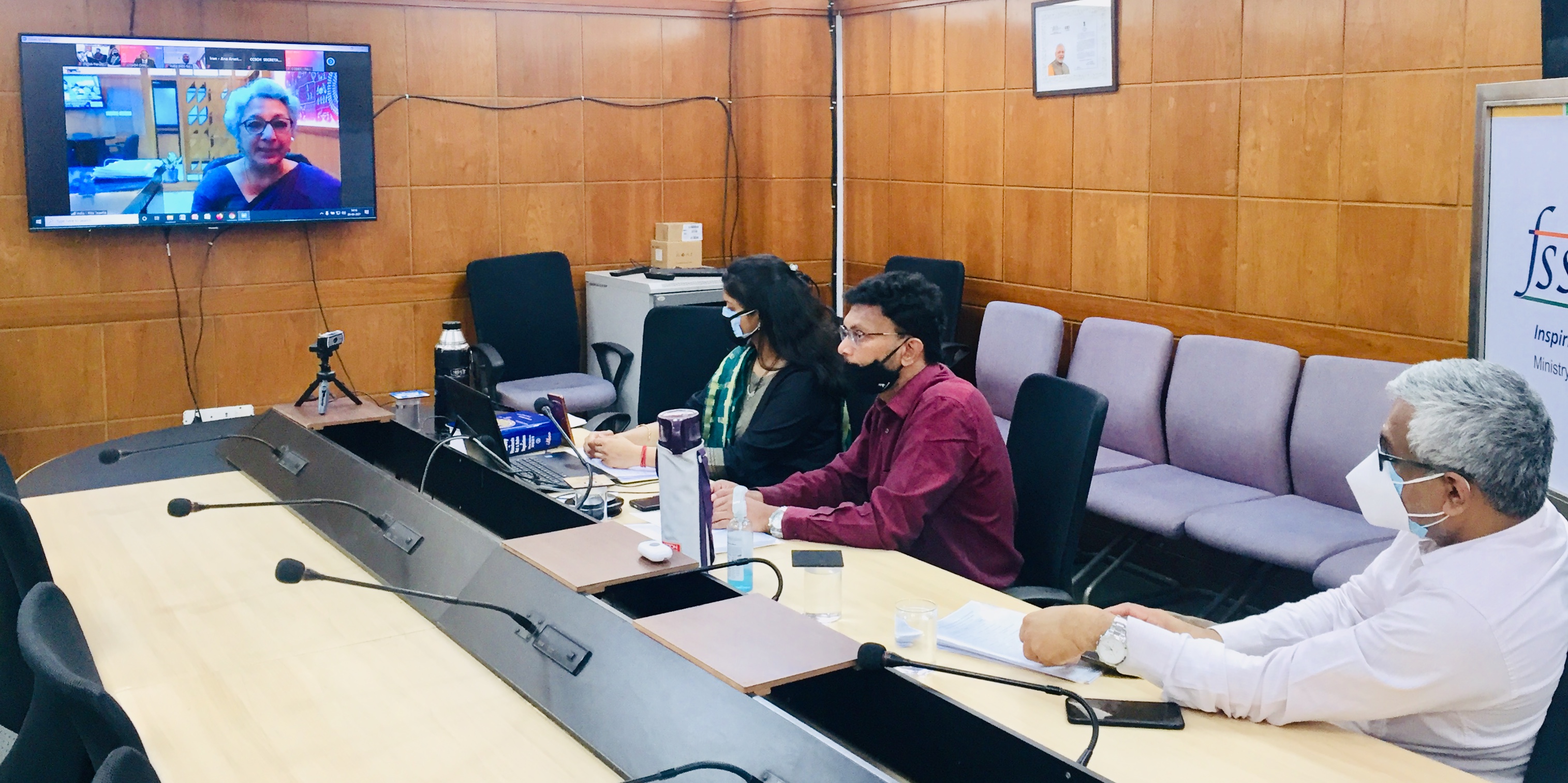The Spice Bowl of the World takes up the challenge of a virtual session
The Codex Committee on Spices and Culinary Herbs (CCSCH) began today with a series of virtual sessions running from 20 to 29 April 2021. Welcoming delegates and speaking on behalf of the hosts India, Mr. D. Sathiyan, Secretary of the Spices Board underlined the physical, technological and logistical challenges facing the committee. “It is heartening and encouraging to note that even in the midst of this difficult situation, the Member Countries have shown tremendous interest in the spices and culinary herbs committee,” he said.
The committee will discuss seven draft standards including oregano, ginger, saffron and basil, all extremely close to being ready for adoption once the committee reaches consensus on outstanding technical details.

Over 150 delegates attend opening of CCSCH5
Working on single items, CCSCH would need over 50 years to develop texts for the 116 named spices and culinary herbs it has identified. The committee will therefore also explore how to save time by grouping them into categories. “It seems an obvious and logical choice to bring in ‘grouping of spices’ to cover more ground quickly,” said Sathiyan.
Developed countries are the major importers of spices and insist on strict standards. “The development of Codex standards for these commodities will help improve the international spice trade,” said Konda Chavva, Assistant FAO Representative in India. In India spices are grown in small landholdings and improving the spices value chain, based on Codex food standards, “will lead to the acceptability of farmers’ products in the global markets and better price realization for small and marginal farmers,” he said.
“In order to be a successful food exporter, a country must produce food that is acceptable to consumers in other countries and which complies with the statutory requirements of the importing countries,” said Roderico H. Ofrin, WHO Representative in India. Both producers as well as the food regulators have a critical role in ensuring compliance with food safety, quality and sustainability standards which is becoming increasingly demanding because of the concern around food safety, especially in the current context of COVID-19 said Ofrin.
We need to be extremely vigilant particularly in the regulatory space.
Ms. Rita Teaotia, Chairperson, Food Safety and Standards Authority of India, described the risk of unscrupulous and intentional adulteration of spices through substitution and alteration due to their high economic value. “This economically motivated adulteration is a major malpractice and we need to be extremely vigilant particularly in the regulatory space to avoid such practices. It is all the more important that we have harmonized Codex standards for spices products in global trade and this is a work that needs the highest priority to ensure the safety and quality of the spices and culinary herbs that are being traded across the world,” she said.

India delegation in Delhi listens to Rita Teaotia at CCSCH5
Guilherme da Costa, Brazil, Chairperson of the Codex Alimentarius Commission reminded those present of their collective responsibility towards the global society regarding food safety. “It is essential and paramount to do our best to develop and disseminate Codex standards to ensure the safety and quality of food for everyone, everywhere,” he said.
Learn more
Programme schedule and all working documents available on the CCSCH5 meeting page.
Download the CCSCH5 Newsletter
Main photo (left to right):
M.R.Sudharshan, Chairperson CCSCH; D. Sathiyan, Secretary, Spices Board; Ms. Rita Teaotia, Chairperson, Food Safety and Standards Authority of India
At the heart of the Codex mandate are the core values of collaboration, inclusiveness, consensus building and transparency. Governmental and non-governmental, public and private organizations alike play a vital role in ensuring Codex texts are of the highest quality and based on sound science.
Codex would have little authority in the field of international standard setting if it did not welcome and acknowledge the valuable contributions made by observers. Expert technical bodies, industry and consumer associations
contribute to the standard-setting process in a spirit of openness, collaboration and transparency.
Intergovernmental organizations (IGOs) and international non-governmental organizations (NGOs) can apply for observer status in Codex in order to attend and put forward their views at every stage of the standard-setting process.
 Current Codex Alimentarius Commission
Current Codex Alimentarius Commission
The Spice Bowl of the World takes up the challenge of a virtual session
The Codex Committee on Spices and Culinary Herbs (CCSCH) began today with a series of virtual sessions running from 20 to 29 April 2021. Welcoming delegates and speaking on behalf of the hosts India, Mr. D. Sathiyan, Secretary of the Spices Board underlined the physical, technological and logistical challenges facing the committee. “It is heartening and encouraging to note that even in the midst of this difficult situation, the Member Countries have shown tremendous interest in the spices and culinary herbs committee,” he said.
The committee will discuss seven draft standards including oregano, ginger, saffron and basil, all extremely close to being ready for adoption once the committee reaches consensus on outstanding technical details.

Over 150 delegates attend opening of CCSCH5
Working on single items, CCSCH would need over 50 years to develop texts for the 116 named spices and culinary herbs it has identified. The committee will therefore also explore how to save time by grouping them into categories. “It seems an obvious and logical choice to bring in ‘grouping of spices’ to cover more ground quickly,” said Sathiyan.
Developed countries are the major importers of spices and insist on strict standards. “The development of Codex standards for these commodities will help improve the international spice trade,” said Konda Chavva, Assistant FAO Representative in India. In India spices are grown in small landholdings and improving the spices value chain, based on Codex food standards, “will lead to the acceptability of farmers’ products in the global markets and better price realization for small and marginal farmers,” he said.
“In order to be a successful food exporter, a country must produce food that is acceptable to consumers in other countries and which complies with the statutory requirements of the importing countries,” said Roderico H. Ofrin, WHO Representative in India. Both producers as well as the food regulators have a critical role in ensuring compliance with food safety, quality and sustainability standards which is becoming increasingly demanding because of the concern around food safety, especially in the current context of COVID-19 said Ofrin.
We need to be extremely vigilant particularly in the regulatory space.
Ms. Rita Teaotia, Chairperson, Food Safety and Standards Authority of India, described the risk of unscrupulous and intentional adulteration of spices through substitution and alteration due to their high economic value. “This economically motivated adulteration is a major malpractice and we need to be extremely vigilant particularly in the regulatory space to avoid such practices. It is all the more important that we have harmonized Codex standards for spices products in global trade and this is a work that needs the highest priority to ensure the safety and quality of the spices and culinary herbs that are being traded across the world,” she said.

India delegation in Delhi listens to Rita Teaotia at CCSCH5
Guilherme da Costa, Brazil, Chairperson of the Codex Alimentarius Commission reminded those present of their collective responsibility towards the global society regarding food safety. “It is essential and paramount to do our best to develop and disseminate Codex standards to ensure the safety and quality of food for everyone, everywhere,” he said.
Learn more
Programme schedule and all working documents available on the CCSCH5 meeting page.
Download the CCSCH5 Newsletter
Main photo (left to right):
M.R.Sudharshan, Chairperson CCSCH; D. Sathiyan, Secretary, Spices Board; Ms. Rita Teaotia, Chairperson, Food Safety and Standards Authority of India
 Codex and Observer
Codex and Observer
around the world since ancient times.
We might not always know where it comes from,
but we expect it to be available, safe and of good quality.










Leave a comment